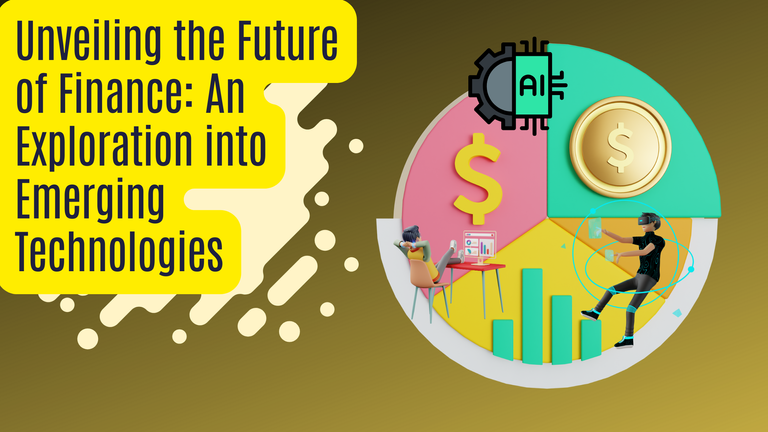Unveiling the Future of Finance: An Exploration into Emerging Technologies

REFERENCES AT THE END OF THIS POST

Introduction
The financial landscape is being continuously reshaped by the advent of groundbreaking technologies. From artificial intelligence (AI) to blockchain, cryptocurrency and decentralized finance (DeFi), each of these technologies holds the potential to revolutionize financial systems globally.
This blog post delineates the core facets of these technologies, evaluates their impacts, and explores the challenges that lie ahead, underscoring the necessity of a balanced approach to harnessing their full potential.

Artificial Intelligence (AI) in Finance
AI is casting a profound impact across various segments of the financial sector by automating manual processes and enhancing efficiency. Key aspects include:
- Advanced Data Analytics: Enabling sophisticated risk modeling, fraud detection, and trading strategies, paving the way for data-driven decision-making.
- Personalized Banking: Through chatbots and robo-advisors, AI delivers a tailored banking experience, augmenting customer satisfaction.
- Bias Perpetuation: If unmonitored, AI can perpetuate existing biases, underlining the importance of ethical AI practices.

Blockchain: A New Era of Transparency
Blockchain technology is gradually transforming the financial sector with its promise of enhanced transparency and auditability. Key highlights include:
- Smart Contracts: Automating complex financial transactions, reducing the reliance on manual processes, and potentially diminishing errors.
- Efficiency Gains: By reducing intermediaries, blockchain can significantly expedite transactions and lower costs.
- Scalability Concerns: Despite its advantages, questions surrounding scalability and energy consumption persist, posing challenges for widespread adoption.

Cryptocurrency: Decentralizing Financial Systems
Cryptocurrencies offer an alternative decentralized payments system, albeit with a unique set of challenges. Core points include:
- Financial Inclusion: With a simple internet connection, cryptocurrencies can broaden financial access, especially in unbanked regions.
- High Volatility: Current high volatility rates present risks for payments, deterring its mainstream acceptance.
- Regulatory Uncertainty: The ambiguous regulatory status of cryptocurrencies in various jurisdictions hampers its broader acceptance and poses potential legal challenges.

Decentralized Finance (DeFi): Reshaping Financial Services
DeFi extends the promise of decentralization to traditional financial services, reinventing them with a more accessible model. Key features include:
- Recreating Traditional Services: DeFi protocols enable services like lending without centralized intermediaries, fostering inclusivity.
- Risk Exposures: The lack of oversight and potential exposure to hacking underscore the risk factors associated with DeFi.

Future Outlook: Bridging Innovation and Responsibility
The integration of these technologies bears the potential to redefine the financial sector fundamentally. However, a cautious approach is imperative:
- Balancing Act: Striking a balance between innovation, ethics, and risk management is crucial to harness the benefits sustainably.
- Regulatory Evolution: Evolving regulatory frameworks and fostering collaborations among stakeholders are essential steps towards a responsible adoption of these technologies.
- Promising Future: With responsible harnessing, the convergence of AI, blockchain, cryptocurrency, and DeFi could significantly expand access and efficiency in the financial realm.

Conclusion
The wave of technological innovation sweeping across the financial sector heralds a future filled with promise yet laden with challenges. By embracing a holistic approach that balances innovation with ethical practices and robust regulatory frameworks, the financial industry can stride confidently into a new era of unprecedented efficiency and inclusivity.

References
Chishti, S. (2023). AI and the future of banking. MIT Sloan Management Review. https://sloanreview.mit.edu/article/ai-and-the-future-of-banking/
Tapscott, D. & Tapscott, A. (2023). Realizing blockchain's potential in financial services. World Economic Forum White Paper. https://www.weforum.org/whitepapers/realizing-blockchain-s-potential-in-financial-services/
Griffith, K. (2023). Navigating the regulatory landscape of cryptocurrencies. The Brookings Institution. https://www.brookings.edu/research/navigating-the-regulatory-landscape-of-cryptocurrencies/
Gensler, G. (2023). Getting smart about decentralized finance. Harvard Business Review. https://hbr.org/2023/03/getting-smart-about-decentralized-finance
Carroll, P. & Simpson, G. (2023). Financial innovation for an inclusive future. OECD Report. https://www.oecd-ilibrary.org/finance-and-investment/financial-innovation-for-an-inclusive-future_8540d5a2-en
I think the transparency of blockchain is what makes people love it more
Indeed @rafzat Happy Monday!